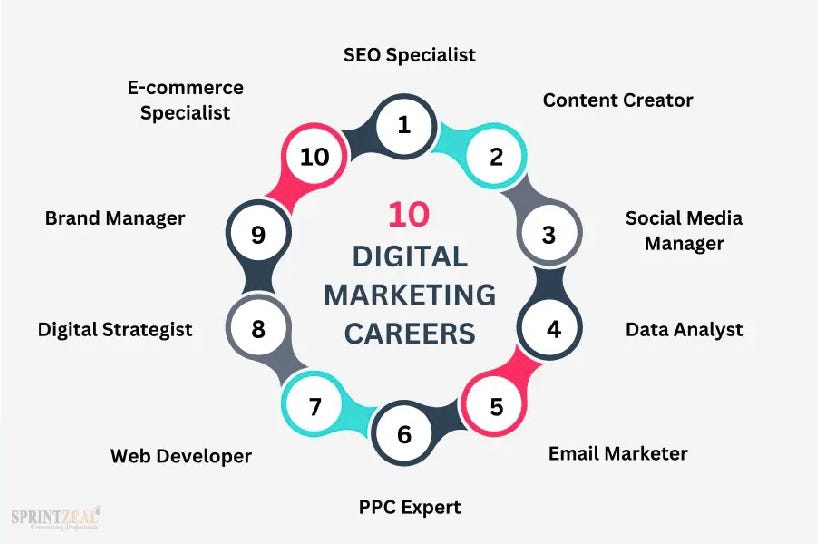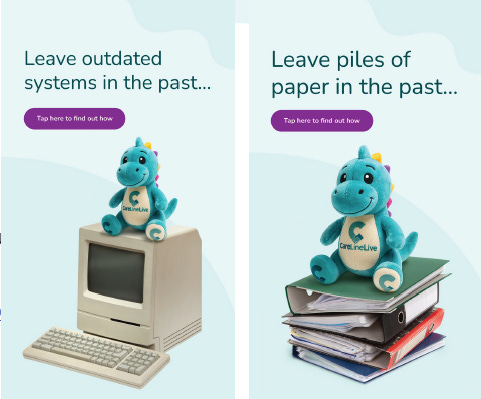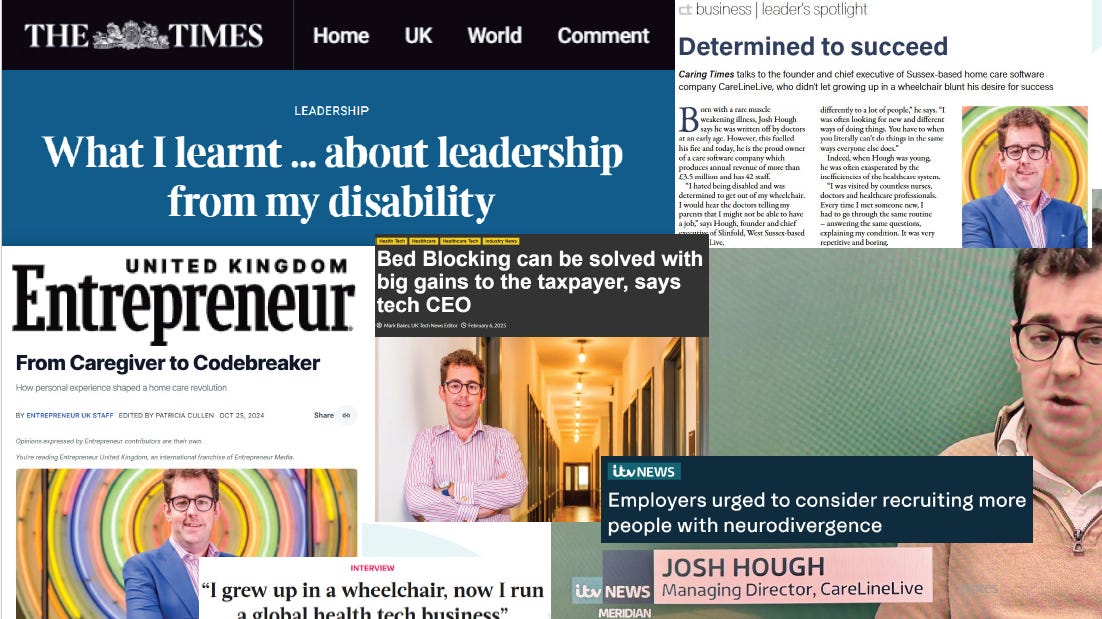Three Key Lessons for Breaking into Media & Marketing: A Practitioner’s Guide
Marie Page, Marketing Manager at CareLineLive, shares battle-tested strategies for landing your first marketing role in a challenging job market
Marie Page, Marketing Manager at CareLineLive
Getting your first marketing job in 2025 takes more than a degree. Economic headwinds and AI disruption have reshaped the industry. Early-career marketers now face a landscape where practical experience and demonstrable skills matter far more than traditional qualifications.
Marie Page, Marketing Manager at global health tech company CareLineLive, has distilled her experience into three core lessons for aspiring marketers. As a CIM Fellow with a first-class Master’s in Digital Marketing Communications, Page brings credibility to a contrarian message: qualifications matter less than proven delivery.
”I’ve received applications from people with Masters in Marketing qualifications,” she explains. ”The two people I most recently recruited had experience of DOING marketing rather than simply studying it.”
This reflects a fundamental shift in employer priorities. Evidence of practical execution now trumps theoretical knowledge especially for newer competencies like social media campaign mechanics and effective AI tool usage.
Experience Trumps Qualifications
The marketing industry’s hiring priorities have shifted decisively. Postgraduate qualifications like CIM diplomas or Master’s degrees still have value, Page holds both—but employers increasingly want candidates who can demonstrate actual delivery.
”Employers care more about what you’ve done than the qualifications you hold,” Page says. ”Real world experience proves you can deliver.”
Her own recruitment decisions prove the point. When hiring for her marketing team at CareLineLive, practical experience consistently outweighed academic credentials. The question that matters: can you execute a social media campaign rather than explain Porter’s Five Forces?
This creates actionable opportunities for job seekers. Working with local businesses, charities or student societies provides legitimate portfolio material. Volunteer work, freelance projects or self-initiated ventures—blogs, podcasts, YouTube channels, TikTok accounts—all serve as evidence of capability.
The key is demonstrating proficiency with industry-standard tools. Familiarity with Canva, Camtasia, Google Analytics or WordPress signals readiness to contribute from day one. Even modest projects can outweigh lengthy qualification lists.
What Employers Actually Seek
Marketing roles in 2025 span diverse disciplines: digital marketing, brand management, content creation, PR, SEO, analytics and social media management. This breadth creates opportunity—but also demands strategic focus from job seekers.
Page highlights three core hiring criteria: skills, experience and motivation. But beyond these fundamentals, several competencies feature consistently in strong applications.
Successful marketers juggle multiple projects simultaneously whilst maintaining meticulous attention to detail. Creative thinking matters. So does proficiency in copywriting—whether through natural writing ability or effective AI tool usage. The role demands rigorous proofreading and adherence to style guidelines, alongside enthusiasm for emerging technologies.
Perhaps most critically, strong interpersonal skills enable the cross-departmental collaboration that defines modern marketing work. These soft skills often prove harder to develop than technical capabilities, yet they fundamentally determine marketing effectiveness. Marketing roles require constant collaboration with sales teams, product development, external agencies and senior stakeholders. Communication skills aren’t optional.
Mastering Tools, Creativity and Strategic Focus
Marketing success hinges on three things: storytelling ability, creative execution and technical capability. Page advocates developing versatility through content repurposing—transform a single piece of content into articles, social media posts, video reels and webinars.
Platform-specific mechanics have become essential. Marketers need fluency in how Instagram Reels and Stories function differently, platform-specific best practices, and crucially, how to use AI tools effectively whilst ensuring outputs don’t appear machine-generated.
Headline craft remains fundamental. ”Headlines should grab attention, think unexpected, fun or quirky,” Page notes, emphasising the importance of standing out in crowded feeds.
Platform strategy requires discipline. The pressure to maintain presence across all social channels can backfire. For CareLineLive’s B2B health tech clients, LinkedIn, Instagram and Facebook deliver the greatest impact. ”Quality over quantity always wins,” Page stresses.
The CareLineLive Technology Stack
Technical proficiency in marketing technology has become non-negotiable. Page shares CareLineLive’s actual marketing stack—a realistic benchmark for job seekers.
The company’s core platforms include WordPress for website management, HubSpot for CRM, email marketing and social media scheduling, and Jira for project and design management. Confluence serves as the internal wiki and content repository. Slack handles internal communications. Microsoft Office—particularly PowerPoint—remains crucial, alongside Teams for meetings and webinars, and Forms for surveys and quizzes. For creative work, the team relies on Camtasia for video editing and Canva for design. Google Analytics provides reporting capabilities. ChatGPT and Perplexity support AI-assisted workflows.
CareLineLive’s agency partners use specialist tools including SEMRush for SEO and keyword research, Surfer for SEO content optimisation, Final Cut Pro for advanced video editing, and Looker Studio for analytics dashboards.
Even basic familiarity with these platforms demonstrates initiative and learning capacity. The specific tools matter less than showing adaptability and willingness to master new technologies.
Real-World B2B Marketing in Practice
How does marketing actually work inside a company? Page details CareLineLive’s comprehensive approach, which spans multiple channels and tactics.
The channel mix is broad. Telesales and sales team collaboration. Events—up to 50 annually. Content marketing forms the foundation for multiple tactics. Paid advertising. Industry association memberships. Search marketing includes PPC, SEO, AI search optimisation and Google My Business. Social media combines organic and paid approaches. Email marketing spans in-house campaigns, demand generation and third-party eDMs. Then there’s public relations, sales promotions (like 12 months for the price of 10), gated content and lead magnets (eBooks, white papers), webinars, referral programmes, review management, and approved supplier listings.
Recent B2B campaign themes demonstrate CareLineLive’s strategic positioning. “Humans not scores” emphasises customer service over metrics. “Leave the Digital Dinosaur behind” promotes modernisation. Customer service focus and authority marketing through thought leadership content reinforce the brand’s market position.
Campaign execution targets care providers with 51-200 staff members, addressing pain points like mandatory council software requirements, ease of use concerns, data migration challenges, and systems failing to keep pace with organisational growth.
Content formats range from customer testimonial reels titled “What we like about CareLineLive” to staff and customer video interviews, behind-the-scenes content and “Day in the Life” videos available at YouTube and campaign-specific landing pages with strong creative assets.
This multichannel approach illustrates the breadth of modern B2B marketing—and the diverse skill sets required to execute effectively.
CV Excellence, Portfolio Development and Network Building
Differentiation starts with presentation. Page recommends a two-page PDF CV that prioritises results over responsibilities. Quantifiable outcomes, campaign performance metrics, engagement rates, conversion improvements—carry far more weight than job descriptions.
The presentation itself matters. As Page notes, the CV should look like a marketer created it—demonstrating design sensibility and attention to detail that align with the role requirements.
Portfolio development extends beyond formal employment. Side projects and volunteer work demonstrate initiative and passion. The portfolio should showcase diverse work: campaign materials, blog content, social media posts and video content. Even video showreels can differentiate candidates in competitive hiring processes.
Where to Find Opportunities
Building experience requires strategic networking and proactive outreach. Internships—even short placements—provide valuable exposure. Volunteering with charities, student societies or local businesses builds portfolio material. Freelance projects for friends’ or family businesses offer practical application, as do self-initiated side projects: blogs, YouTube channels, TikTok accounts, podcasts. Marketing competitions and challenges create competitive portfolio pieces. Pro bono offers to local businesses through community Facebook groups can surface unexpected opportunities.
Networking channels include LinkedIn and Twitter for professional connections, university career services, local SMEs and charities requiring marketing support, and online freelance platforms like Fiverr and Upwork. Marketing events, webinars and networking groups provide industry exposure. Business Network International (BNI) chapters and local Chamber of Commerce events offer structured networking. Alumni networks frequently prove valuable for insider introductions.
These connections often surface unadvertised opportunities and provide insider knowledge about hiring organisations. Page emphasises that many marketing roles never reach job boards—they’re filled through referrals and professional networks.
Continuous Learning and Professional Development
Experience outweighs qualifications in hiring decisions. But strategic upskilling still adds value. Page recommends focusing on credentials that build practical knowledge and industry credibility.
Valuable learning resources include professional certifications from the Chartered Institute of Marketing (CIM), Digital Marketing Institute programmes, Google Digital Garage courses, HubSpot Academy certifications, and LinkedIn Learning paths. These options provide structured learning without requiring full postgraduate investment. They signal commitment to professional development whilst building applicable skills.
Page particularly values the CIM qualification pathway, having served as both a CIM trainer and examiner before becoming a CIM Fellow. However, she emphasises that such credentials complement rather than replace hands-on experience.
Developing Essential Marketing Skills
Certain capabilities prove particularly valuable for entry-level marketers. Page recommends prioritising five core areas.
Copywriting and content creation require practice. Write compelling headlines. Craft social media posts. Understand how to use AI tools like ChatGPT effectively whilst maintaining authentic voice and ensuring outputs don’t appear machine-generated.
Analytics and measurement skills enable marketers to demonstrate impact. Learn Google Analytics fundamentals. Master basic Excel data manipulation. Build dashboards. Understanding how to prove campaign effectiveness has become essential.
Design capabilities matter, even at basic levels. Proficiency in Canva, PowerPoint or Photoshop helps marketers execute ideas quickly without constant reliance on design teams.
Social media fluency demands understanding of platform-specific trends, engagement tactics, content formats—Reels, Stories—and best practices for each channel. Knowledge that evolves constantly.
Presentation and storytelling skills prove crucial for client work and internal stakeholder management. Clear, compelling communication developed early provides lasting competitive advantage.
These practical capabilities matter more than theoretical frameworks. As Page notes in her recruitment experience, demonstrating you can execute a social media campaign trumps knowledge of the Ansoff matrix or Porter’s Five Forces.
The Attitude Advantage
Page’s framework ultimately emphasises mindset over credentials. Her closing thought captures the essential insight: ”Experience is proof. Creativity is currency. Attitude is everything.”
In a sector experiencing technological disruption and economic uncertainty, this practitioner-focused approach offers a realistic pathway for early-career marketers. The emphasis on demonstrable skills, strategic focus and proactive networking reflects how the industry actually hires today.
The key principles: Don’t wait for permission—start building your portfolio now. Create a body of work, however modest initially. Stay curious. Experiment with emerging tools and platforms. Network strategically, recognising that many opportunities never reach job boards. Use every project to demonstrate measurable impact. Prioritise initiative and creativity over lengthy course lists.
The toughest marketing job market in years demands more from candidates than previous generations faced. But it also rewards those who prove they can deliver. As Page’s own hiring decisions demonstrate, showing beats telling. Every time.
About Marie Page
Marie Page serves as Marketing Manager at CareLineLive, a global health tech company providing all-in-one home care management software trusted by over 700 agencies. Her career spans PR, content marketing and digital campaigns across multiple sectors.
Page holds a first-class Master’s in Digital Marketing Communications and is a Fellow of the Chartered Institute of Marketing (CIM), where she previously served as both trainer and examiner. She founded marketing consultancy The Digiterati and training company Digiterati Academy, serving small and medium-sized enterprises. As a lecturer in digital marketing at two universities’ Master’s programmes and conference speaker across the UK and Canada, Page brings both academic rigour and practical implementation expertise to marketing education.
Her focus centres on helping early-career marketers develop practical skills that drive real-world impact.
The complete hour-long seminar How to Get Ahead in Marketing is available free at carelinelive.com/get-ahead-marketing-student-advice









